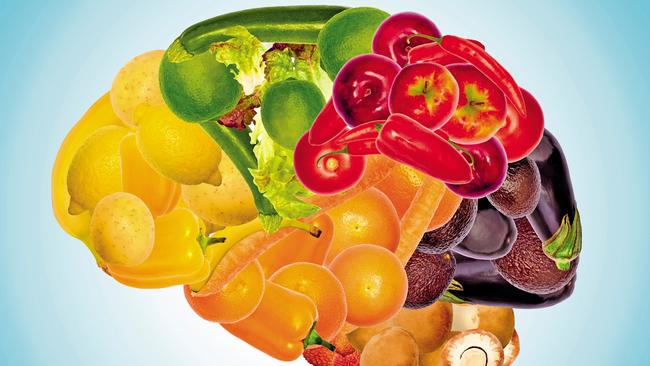Get off the diet rollercoaster and think yourself thin
HERE’S how to get off the dieting rollercoaster with science’s answer to healthy, effective weight loss.

Body+Soul Daily
Don't miss out on the headlines from Body+Soul Daily. Followed categories will be added to My News.
HERE’S how to get off the dieting rollercoaster with science’s answer to healthy, effective weight loss.
IF YOU’VE ever been on the weight loss rollercoaster, you’re already familiar with the highs and lows of that ride. From kilojoule counting to protein shakes, dieting pills to personal training, you’ve probably tried it all with no long-term success.
But what if we told you there’s a much gentler and more effective approach to shedding the kilos and you already have what you need right between your eyes?
PLASTIC FANTASTIC: THE CHANGEABLE BRAIN
A NEW book by bestselling author Dr Helena Popovic presents a scientific approach to dieting and weight loss.
Neuroslimming: Let Your Brain Change Your Body is a common sense guide that taps into the science of neuroplasticity – the ability to change the brain.
In her book, doctor and brain specialist Popovic exposes common myths and misconceptions surrounding weight loss and introduces us to our most powerful weapon against fat gain – our brain.

“If we can change our brain, it follows that we can also change our body. And that’s something we’ve been ignoring for too long but it’s where our real power lies. Unless we address what’s going on in our brains, we’re never going to get long-term success in actually reducing our body fat,” Popovic says.
TAKING CONTROL OF THE CONTROL CENTRE
THE brain, she explains, is our control centre and every part of the body follows the instructions and signals sent out by the brain.
It effects the hunger response, motivation to exercise, food choices and hormone regulation.
“For example, when we feel angry, it’s our thoughts feeding that emotion and in that state we start to produce cortisol, which is the hormone of chronic stress that kills brain cells and also instructs the body to lay down fat around our abdomen. So in fact, anger influences where we deposit fat in our bodies,” Popovic says.
She also reveals the important role hunger plays in our efforts to avoid fat gain and lose those excess kilos.
“Physiological hunger is the hunger for nutrition. It’s your body saying you’re low on energy, nutrients, you need to top up,” she says.
“If we only eat when we’re physiologically hungry – that comes on gradually and is usually a gnawing, physical sensation in the stomach – we would eat... about 30 per cent less.”
She says with psychological hunger, we eat not because we need nutrition but rather because we’re sad, angry, upset, anxious, bored or procrastinating.
“[Psychological hunger is] getting into the habit of using food to fulfil a whole heap of roles it’s not meant to fulfil,” Popovic says.
WHY DIETING IS DANGEROUS
POPOVIC says that by controlling our emotions, we’re also proactively controlling our bodies’ physiological reactions, which is something kilojoule-counting diets, for example, fail to achieve.
“Say your average calorie intake is 2000 [8360kJ] a day and you go on a diet that allows you 1500 calories [6270kJ]… the minute you drop the calories to that degree, you’ll be losing about 40 per cent muscle and 40 per cent fat, and the rest might be bone or water. So why diets are dangerous is because we lose a hell of a lot more body tissues than fat.”
Popovic goes on to say that around 90 per cent of people who lose weight on a diet will “regain it all as fat”.
What this means is that our fat-to-muscle ratio goes up, our metabolic rate goes down, and we have to take in even fewer kilojoules to maintain the weight we started with.
“That’s why some people will say, ‘I’m only eating what I used to eat and now even that’s making me gain weight’. It’s because they’ve lost muscle,” she says.
“The more muscle we have, the more insulin-sensitive we are and the better our bodies function.”
MIND OVER MATTER
NEUROSLIMMING applies the latest discoveries in brain science to effectively and sustainably reduce body fat. It’s about understanding your brain and how it affects your body and then applying that knowledge to regulate your weight.
“This is not about diets, exercise, motivation, mindset or positive psychology,” Popovic says.
“It goes much deeper into the very essence of how our brain cells communicate with each other and with the rest of the body to influence our appetite, assimilation of food, weight set-point and weight distribution.
“Every part of the body follows the instructions, directions and signals sent out by the brain. The mind-body connection is critical to every aspect of our lives – the brain is the largest slimming organ we have.
“So it’s not necessarily about what we eat, it’s also about the why and how we eat,” she says. “Because the ‘why’ and ‘how’ determine the ‘what’.”
Now that’s food for thought.


